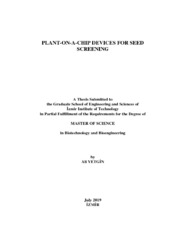Please use this identifier to cite or link to this item:
https://hdl.handle.net/11147/7463Full metadata record
| DC Field | Value | Language |
|---|---|---|
| dc.contributor.advisor | Pesen Okvur, Devrim | |
| dc.contributor.advisor | Canlı, Kerem | |
| dc.contributor.author | Yetgin, Ali | - |
| dc.date.accessioned | 2019-12-12T06:52:23Z | |
| dc.date.available | 2019-12-12T06:52:23Z | |
| dc.date.issued | 2019-07 | en_US |
| dc.identifier.citation | Yetgin, A. (2019). Plant-on-a-chip devices for seed screening. Unpublished master's thesis, İzmir Institute of Technology, İzmir, Turkey | en_US |
| dc.identifier.uri | https://hdl.handle.net/11147/7463 | |
| dc.description | Thesis (Master)--Izmir Institute of Technology, Biotechnology and Bioengineering, Izmir, 2019 | en_US |
| dc.description | Includes bibliographical references (leaves: 28-31) | en_US |
| dc.description | Text in English; Abstract: Turkish and English | en_US |
| dc.description.abstract | Thanks to their roots, plants take the required molecules from the soil, therefore their research is important. The fact that absorption takes place from the root hair makes the observations necessary. The inadequacy of traditional methods requires the development of new methods to ensure their observations, especially during root studies. The fact that chip systems have the features that can overcome the problems has caused plant researches by using this method. The fact that environmental factors can be imitated in chip systems paves the way for abiotic stresses to work. Although abiotic stresses have been studied extensively on plants, seed germination and subsequent root extension and root hair formation have not been studied in detail except for the model organism (Arabidopsis thaliana). The use of chip system for plant studies of scientists have begun the 21st century is also reveals the need to do more work in this area. Researchers show that they are excited about the advantages they bring to the system and that necessary studies will be carried out in other side branches. It is thought that more research will be done by using chip systems after a short time. By using chip systems, a suitable environment for seed growth can be provided and environmental conditions can be simulated. By creating the desired controlled environment, it is possible to create a system which results in less time and less cost in order to replace the inconvenient and expensive method. | en_US |
| dc.description.abstract | Bitkiler kökleri sayesinde gerekli molekülleri topraktan alırlar, bundan dolayı araştırmaları önemlidir. Özellikle emilimin kök kıllarından gerçekleşiyor olması bunların gözlemlerini gerekli hale getirir. Geleneksel yöntemlerle yapılan çalışmaların yetersiz olması, özellikle kök çalışmaları sırasında onlara zarar vermeden gözlemlerini sağlayacak yeni yöntemlerin geliştirilmesini gerektirmektedir. Yonga sistemlerinin sorunların üstesinden gelebilecek özelliklere sahip olması, bu yöntemi kullanarak bitki araştırmalarının yapılmasına neden olmuştur. Çevresel faktörlerin yonga sistemlerinde taklit edilebiliyor olması abiyotik streslerin çalışabilmesinin önünü açmaktadır. Abiyotik stresler bitkiler üzerinde yoğun bir şekilde çalışılmış olmasına rağmen tohum çimlenmesi ve bundan sonra meydana gelen kök uzaması ve kök kılı oluşumları model organizma (Arabidopsis thaliana) dışında detaylı olarak çalışılmamıştır. Bitki çalışmaları için yonga sistemlerin kullanılması 21. yy da başlamış olup bilim insanlarının bu alanda daha çok çalışma yapılmasının gerekliliğini ortaya koymaktadır. Araştırmacılar sistemin getirdikleri avantajlar konusunda heyecanlı olmaları diğer yan dallarda da gerekli çalışmaların yapılacağını göstermektedir. Kısa süre sonra yonga sistemleri kullanarak daha çok araştırmalar gerçekleştirileceği düşünülmektedir. Yonga sistemleri kullanarak tohumun büyümesi için gereken uygun ortam sağlanabilir ve çevre koşulların taklidi sağlanabilir. İstenilen kontrollü ortam yaratılarak normalde zahmetli ve pahalı olan yöntemin yerini daha kısa sürede ve az maliyetle sonuç veren bir sistemin oluşturulması mümkündür. | en_US |
| dc.format.extent | x, 31 leaves | en_US |
| dc.language.iso | en | en_US |
| dc.publisher | Izmir Institute of Technology | en_US |
| dc.rights | info:eu-repo/semantics/openAccess | en_US |
| dc.subject | Chip systems | en_US |
| dc.subject | Seed screening | en_US |
| dc.subject | Abiotic stress | en_US |
| dc.subject | Fertilizer | en_US |
| dc.title | Plant-on-a-chip devices for sed screening | en_US |
| dc.title.alternative | Tohum taraması için yonga-üstü-bitki aygıtları | en_US |
| dc.type | Master Thesis | en_US |
| dc.institutionauthor | Yetgin, Ali | - |
| dc.department | Thesis (Master)--İzmir Institute of Technology, Bioengineering | en_US |
| dc.relation.publicationcategory | Tez | en_US |
| item.languageiso639-1 | en | - |
| item.openairecristype | http://purl.org/coar/resource_type/c_18cf | - |
| item.openairetype | Master Thesis | - |
| item.cerifentitytype | Publications | - |
| item.fulltext | With Fulltext | - |
| item.grantfulltext | open | - |
| crisitem.author.dept | 03.01. Department of Bioengineering | - |
| Appears in Collections: | Master Degree / Yüksek Lisans Tezleri Sürdürülebilir Yeşil Kampüs Koleksiyonu / Sustainable Green Campus Collection | |
Files in This Item:
| File | Description | Size | Format | |
|---|---|---|---|---|
| T001894.pdf | MasterThesis | 1.2 MB | Adobe PDF |  View/Open |
CORE Recommender
Page view(s)
234
checked on Oct 14, 2024
Download(s)
174
checked on Oct 14, 2024
Google ScholarTM
Check
Items in GCRIS Repository are protected by copyright, with all rights reserved, unless otherwise indicated.